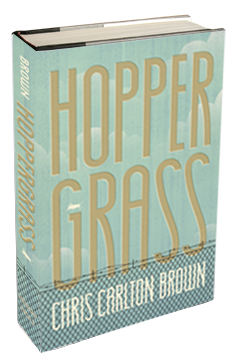Hoppergrass Sample Chapter

CHAPTER ONE
How to Use
the Commode
It’s always a clean, white car—this time a Ford. It’s always a young man who drives it, a student of social work or corrections. Cornfields and pastures roll on the opposite side of the glass like a movie until we get to the river and cross it. When we arrive at the Intake Cottage, I sit on an orange plastic chair in front of two ladies who are typing. One of the ladies makes a call and, after a while, a skinny man comes in. The lady hands him a file, and the driver hands me over to the skinny man who takes me to a room with more plastic chairs around a table. One boy with a buzz-cut, wearing brown clothes that remind me of grocery bags, sits at the table. We can hear the ladies through the wall typing and chatting.
As soon as the skinny man leaves, the other boy starts to talk. “My name’s Beadron. They call me Babybird. On the street I was the singer for a band. You ever heard of the Sheba Club in DC?” I shake my head. “We played there,” he says. Then he half closes his eyes and starts to sing, “I won’t be your second choice, I’m going to be your number one or I’m not going to be there at all.” He sings it too slowly, so I don’t recognize the song until later. He really looks like a baby bird. His neck’s long, and his head is fuzzy.
After a while, a man comes in and calls my name from the open file folder in his hand. Heis very big and half-bald and speaks in a no-nonsense but relaxed, deep voice.
“My name is Mr. Ball; I’m going to take you up to Cottage B.”
Then he walks me up the hill in the June heat. A breeze blows now and then off the river that spreads below and behind us. Boys in the distance are cutting grass with sickles.
On the hill, a big old brick dining hall spreads across one end of the courtyard. At the opposite end there’s another building, not as wide but high, that looks like a huge brick barn. Next to the brick barn is a white chapel. Old brick cottages flank the other two sides of the courtyard and sycamores line the sidewalks. If you could shrink the courtyard, it would look like a model “hometown of the past” on a train set. We head off down behind Cottage B, on the far side of the square next to the brick barn.
Down the slope you can see cows in the fields and a barn in the distance. Closer in to the cottage, boys with buzz cuts and grocery bag uniforms and brogues are beginning to stand up from the shade of live oaks. They are lining up for watermelons that are quartered and handed out from the back of a flatbed truck. Boys are sitting around in clusters under the oaks in the still afternoon heat, chattering and eating watermelon, with that breeze now and then coming up across the fields from the river.
Mr. Ball took me over to Mr. Lindquist, the Cottage B house father. Mr. Lindquist was thin and not tall, but he spoke hearty. “Welcome to Belmont School for Boys” he said in a military way. He told me he was a marine, and that the boys of Cottage B were good boys, mostly, but if I had any trouble, I was to tell him, and not try to settle it myself. “If there’s going to be any fighting around here, it’s going to be with me.” Then he told me to get in line for some watermelon before it was all gone. I was the only one in line wearing street clothes.
I got a quarter of a watermelon and went over and sat next to two white boys under a tree.
A dark-haired boy with freckles asked me, “Did you come up from the diagnostic center?”
“Yeah,” I said.
“I’m Evan, what’s your name?”
“Bowser.”
“That’s a dog’s name,” said Evan.
A big boy with wiry blonde hair broke in, “You call him a dog, he’ll show you to a dog named, ‘duke,’ man. I was at the diagnostic center with this boy. He got into it with a big black guy and shot his cuff—got him right by his trowsers and threw him. He’ll give you a go with the dukes all right.”
“We call him Snicklesnort,” said the freckled boy.
“’Snicklesnort,’ Is that what they called you at the diagnostic center?” I asked him.
“No, they called me Jerry.” I could see how he got his nickname. He talked as though he were complaining all the time.
“Yeah, I remember you at the diagnostic center,” I said. It wasn’t true, but as soon as I said it, it became part of our story—we knew each other before we got to the Hill.
At the diagnostic center the boys thought I might be squirrelly because I was quiet and read books. We had wrestling one day and I pinned a hardrock who didn’t know how to wrestle. That I didn’t get creamed surprised everyone so much that stories started popping up in other cottages. Sometimes I beat up a big guy, sometimes two, sometimes a counselor. I figured it was a good story to keep me out of fights. Each boy who told it knew it would put him on my good side, and it did.
All the boys went through the diagnostic center: Deaf boys, retarded boys, abused boys, insane boys, delinquents, and boys who didn’t have anywhere else to go. All the girls went through the diagnostic center too, but lived in separate cottages. We were all sorted and distributed out from there. Boys were sent to foster homes or to forestry camp or to special treatment schools. Delinquent boys fourteen and older came to Belmont School for Boys, known to us as “The Hill.”
There were twenty of us boys in Cottage B. Mr. Lindquist and his wife lived in the part that looked like a house upstairs. Before breakfast and after dinner we hung out in the cottage basement and Mr. Lindquist watched us from a desk in front. We sat on indestructible wooden chairs painted with thick enamel the grey color of a ship’s hull at heavy round wooden tables that would be nearly impossible to throw and would be hard to even turn over. The tables were enameled the same forest green as paint that covered the cinder block walls up to chest height from the concrete floor. After showers, we marched upstairs to a dorm wing where we slept in double-decker bunks stacked along both walls of a narrow hall, with windows at intervals on each wall. They left the windows open so you could hear night insects through the security mesh.
That first evening after eating watermelon, I took a seat at the table with Snicklesnort, Evan, and Babybird. There was also a Mexican kid there named Ben Susan.
Evan introduced me, “You heard of the boy named Sue? This is the girl named Sue.
Ben Susan gave him a dark look, and Evan laughed and patted him on the shoulder. “Ben Susan’s a good guy.” The Mexican was small but he was sprung tight like a switchblade.
We started swapping stories right off—Hill stories and street stories. Babybird was talking about how he got sent up. “My uncle and me was breaking into soda and snack machines all over the county. When my uncle went to court, the judge said, ‘six months in the county jail,’ and my uncle said, ‘I can take that standing on my head.’ And the judge said, ‘all right, one to three years, state penitentiary’.” Babybird was chuckling over how witty his uncle was until Snicklesnort weighed in.
“That is the stupidest thing I have ever heard.”
Babybird snapped back at him, “I’ll tell you what; my uncle can kick your ass.” Then he settled back, satisfied that he’d won the argument. Babybird turned to me, “You’re going to need a locker mate. You want to share with me?”
“Sure,” I said without thinking, and everyone went quiet for a minute, like I’d farted.
When I got up to go to the water fountain, Ben Susan got up too. I didn’t like him walking behind me, so I stopped and turned aside and he stopped too. Mr. Lindquist yelled, “Smoke em if you got ‘em.”
Ben Susan said, “Shoot me a fog,” and I took out a Camel for him and one for me. We were standing at the entrance to the area with sinks and showers. “Listen, man,” Ben Susan said, “you don’t want to share your locker with Babybird. He don’t get nothing from home. He’ll be smoking all your fogs. Pair up with Evan; he gets cookies and stuff all the time.”
Back at the table, Babybird had picked up a pencil and was drawing pictures. Snicklesnort asked me what I was sent up for and I answered, “Nothing.”
“Nothing?” He asked.
“Yeah. I was a victim of circumstance,” I said.
They all stared at me, trying to figure out whether I was messing with them. The answer had already become an inside joke between me and myself. I knew I was guilty as hell. I just couldn’t come up with the right story of exactly what it was I was guilty of. What I knew for sure was that Bradley Davis was dead, and that if there were any circumstances to blame, I wasn’t a victim of them, I had made them. The answer always distanced me from the other boys.
